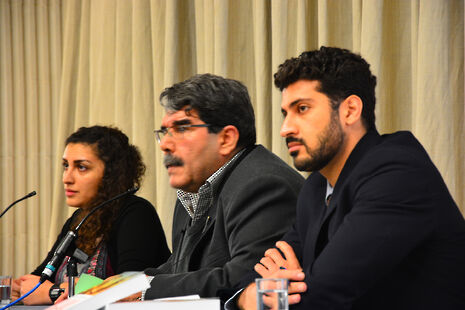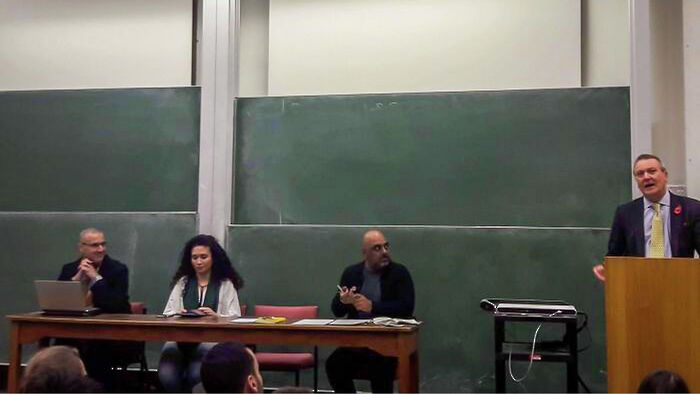The reality of Prevent: lacking in consistency and accountability
The roll-out of the Prevent legislation saw stark inconsistencies across colleges

When asked at last term’s open meeting whether the Prevent duty poses a “fundamental threat”, the University’s vice-chancellor Stephen Toope replied unequivocally: “Yes.” As for its mandatory implementation, he said “the good news” is that the University’s Prevent committee has only met twice, and they are “really committed to trying to take the lightest possible touch”.
“Light touch” has been a common thread in the University’s rhetoric, in response to widespread criticism of Prevent by students and staff. When the University’s administration began its rollout of the legislation in 2016, an administrator said it would be used “very, very, very rarely”. So far, the University has made only one direct action under Prevent: its November intervention in a Palestine Society event, in which the organised chair was replaced by Paul Mylrea, Cambridge’s head of communications. After drawing condemnation, the University has characterised the incident as a “mistake”, subsequently apologising and promising to “do better”.
The reality of Prevent implementation across the University and colleges has been characterised by inconsistency
However, this is far from the full picture: though Cambridge implemented its own Prevent procedures, the status of the colleges as separate legal institutions means that compliance is their own responsibility. A Varsity investigation has found that the reality of Prevent implementation across the University and colleges has been characterised by inconsistency, and a lack of transparency and accountability.
The legal requirements of Prevent required a joined-up approach, which was theoretically made easier by the fact that it presented an opportunity for a top-down, standardised implementation. This role fell to the Office for Intercollegiate Services (OIS), the body which facilitates logistical support between Cambridge’s colleges and also manages the intercollegiate committees, produced a standardised set of guidance documents to avoid the duplication of labour. This included risk assessment spreads, guidance on process, staff training information, and draft freedom of speech statements for colleges to adopt – as well as advice on how to respond to Freedom of Information requests.
The efficacy of the guidelines in encouraging a cohesive approach across colleges, however, has been called into question by the results of Varsity’s investigation, which found that Cambridge’s colleges had already splintered into strikingly varied practices.
Most colleges have responded to the new laws by forming some kind of committee, which monitors and reports on implementation. Using freedom of information requests, Varsity asked for minutes of all colleges’ Prevent committees meetings, and details of any interventions that had taken place. Several colleges rejected parts of the requests: Trinity did not send minutes as they contained “sensitive information”, Churchill and Homerton said their committees did not take minutes, and Magdalene said its committee only communicated over email.
The investigation further found that three colleges took different approaches in processing the same speaker under Prevent. St John’s took a comparatively vigorous approach to its implementation: the college called for all its student-facing and welfare staff to undergo Prevent training, including porters, tutorial and academic staff, and bedders. In addition, a two-page section of its student handbook tells Johnian students to monitor peers for signs of radicalisation, and instructs them on how to make reports if they are suspicious.
By contrast, several colleges took relatively ‘soft’ approaches, with some only extending training to tutorial staff and directors of studies. Jesus’s Prevent committee found in a February 2017 review that much of the training they planned had not been carried out. Despite this, the committee decided “not to press the matter further with those that have not completed the training to date”.
Got a story for us?
Seen something you think Varsity should be talking about? Contact our News team at news@varsity.co.uk.
When asked about these disparities, Head of the OIS Matthew Russell said that he had “no view”, other than that it appears “entirely natural and normal” that Colleges should take different approaches to their Prevent duty.
St John’s were also one of only a few colleges which chose to answer our request for details of any interventions that had taken place, naming two: a John’s Theological Society event, and a panel on Kurdish political struggles hosted by the Kurdish Society in November 2016.
Barzan Sadiq and Dilar Dirik, who organised the event, told Varsity that they had not been aware of its referral through the Prevent process prior to being contacted as part of this investigation. What they described of their experience, however, appeared remarkably similar to how a Palestinian Society event was handled by the University one year later.
Shortly before the event was due to take place, they were told that Dirik, whom they planned to co-chair the panel, could not do so because she was judged not to be a “neutral person who can fairly chair the session” after checking her “speeches and texts online”. Though they eventually managed to negotiate Dirik’s presence on the panel in order to assist an external speaker with English, she was not permitted to contribute to the discussion herself. A University proctor also sat in on the event “to observe that freedom of expression [was] guaranteed”, although no reasons were given as to why this was deemed necessary.
What has the Prevent policy meant for freedom of speech at Cambridge?
Write for Varsity and have your say. Just email our Opinion team with a 100-word pitch.
They described the measure as “a very petty form of harassment and a blatant case of Orwellian politics”, and drew links to the “criminalisation of the Kurdish freedom movement” by European governments. They added: “It is absolutely shocking, distressing and also frustrating to see that we have been subjected to this controversial process, especially in such an opaque and secretive manner, without any explanation, justification or information. It says a lot about the scheme that we were not even aware that we were subjected to it.”
Issuing a “demand [for] transparency, explanation and an apology from St. John’s College and the University”, they also alleged that the University was not applying its Prevent duty fairly: “It is not surprising that this scheme is targeting vulnerable communities such as Muslims in times of Islamophobia, or Kurds in the context of massive genocidal attacks in the region.”
Another college that gave details about Prevent interventions was King’s, who stated that the duty had only ever been applied to one speaker, Mark Regev. However, Varsity also spoke to Abdulla Zaman, a student at King’s who said that an event he had organised at the college – a debate about Islam in Europe hosted by the Islamic Society – was cancelled following questions raised by King’s staff about a controversial speakers.
During a meeting with a King’s professor, Zaman was told that the college could get into trouble with the government if a speaker were to say something controversial, and that as the organiser of the event, he would be responsible. Zaman said that he assumed these remarks were directed at one proposed speaker, Abdullah al Andalusi, who had recently been criticised by an article by the Telegraph.
Concerned that the event might be cancelled, Zaman said that he offered to disinvite al Andalusi, a decision supported by the professor. However, the disinvitation led to one of the remaining speakers declining to attend; another wrote to the Islamic Society expressing concerns about the event and asking to talk to the organiser. As a result, the Islamic Society were forced to cancel the debate altogether.
King’s omission of this incident in their response to our freedom of information request suggests that despite the fact that their intervention was a significant contributing factor to the cancellation, it was not formally recorded – there would be no official process by which to appeal, or public channel through which to find out it had even taken place.
 News / Colleges charge different rents for the same Castle Street accommodation2 March 2026
News / Colleges charge different rents for the same Castle Street accommodation2 March 2026 News / News in Brief: waterworks, wine woes, and workplace wins 1 March 2026
News / News in Brief: waterworks, wine woes, and workplace wins 1 March 2026 News / Climate activists protest for ‘ethical careers policy’1 March 2026
News / Climate activists protest for ‘ethical careers policy’1 March 2026 News / Angela Merkel among Cambridge honorary degree nominees27 February 2026
News / Angela Merkel among Cambridge honorary degree nominees27 February 2026 News / Private school teacher who lied about Cambridge degree barred from teaching27 February 2026
News / Private school teacher who lied about Cambridge degree barred from teaching27 February 2026










